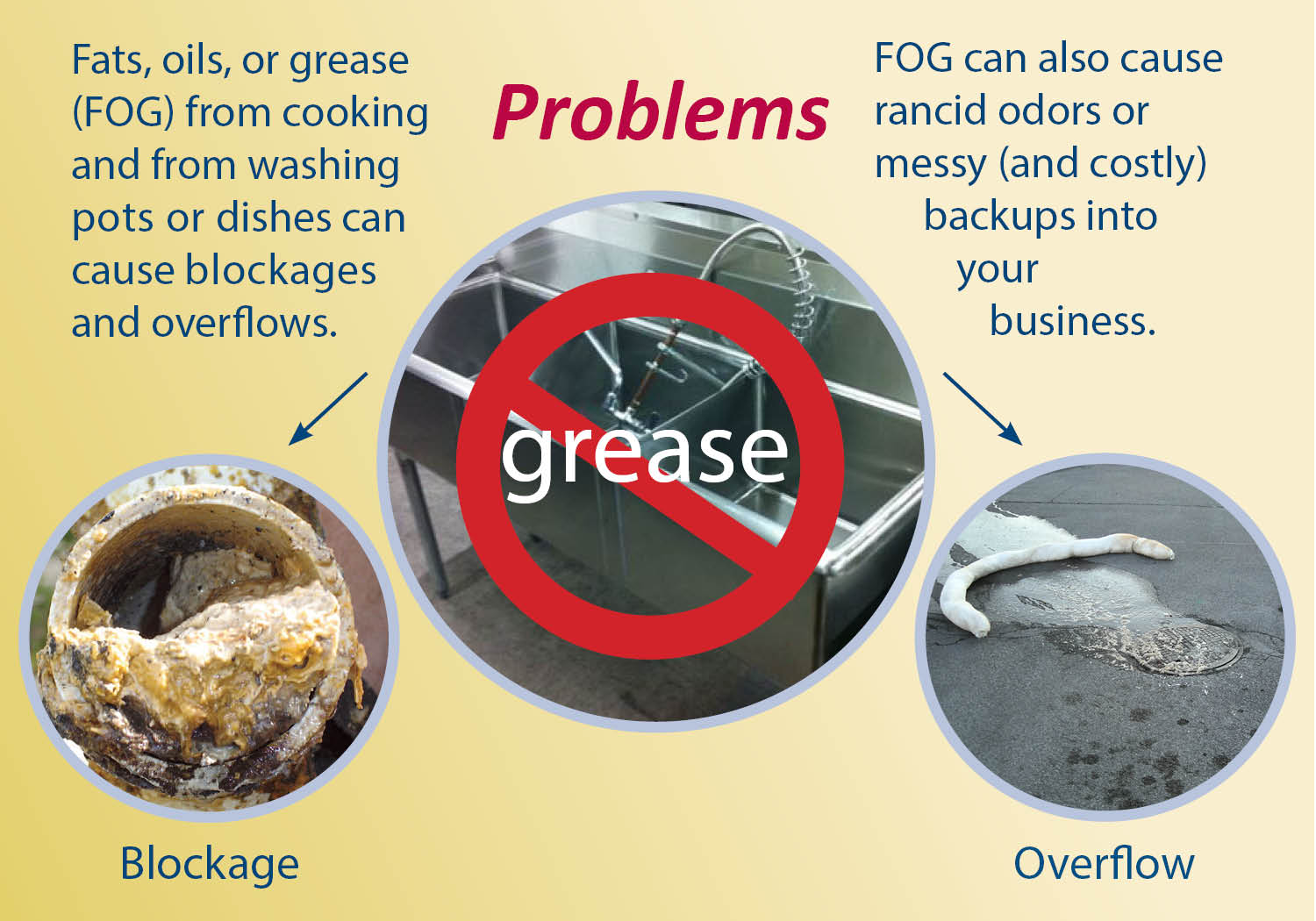Grease Control Program

Food Service Facilities Guide (English)
Food Service Facilities Guide (Spanish)
Requirements for New or Newly-Remodeled Food Service Facilities (FSFs)
All new or newly-remodeled FSFs inside KUB’s wastewater service area will be required to install approved grease control equipment and to ensure that the equipment is properly operated and maintained.
Click here to submit a permit application so KUB can determine and communicate to you the type and size grease control equipment required for your facility.
Requirements for Existing Food Service Facilities (FSFs)
All existing FSFs inside KUB’s wastewater service area are expected to conduct their operations in such a manner that fats, oils and grease (FOG) are captured on the user's premises; the user must also properly dispose of the FOG.
- KUB will periodically inspect each FSF on an as-needed basis to ensure that each is complying with the intent of KUB’s Grease Control Program.
- All FSFs must keep grease control equipment cleaning logs current, clean grease control equipment per the schedule assigned by KUB, and post “No Grease” signs above fixture drains.
- KUB will identify and target "grease problem areas" in the wastewater collection system through preventative maintenance records and emergency calls related to FOG. FSFs located upstream will be identified as potential contributors to the FOG build-up.
- All FSFs in the vicinity of “problem areas” will be inspected. Each facility's grease control practices and the adequacy of their grease control equipment will be assessed. Maintenance/Cleaning records may also be reviewed.
Post Inspection Phase
Following an inspection, KUB will provide a copy of the completed inspection form and any other materials the facility needs, such as an equipment cleaning log, a Grease Control Program, or “No Grease” signs, as well as, documentation of any noncompliant issues observed. The inspection will typically result in one of the following actions:
- Facilities equipped with appropriate and adequately-sized grease control equipment that are meeting the intent of the KUB Grease Control Program through effective practices will be commended for their compliance.
- Noncompliant facilities may be required to improve housekeeping and increase the cleaning frequency of their existing grease control equipment.
- Facilities that are not successful in achieving compliance with the intent of the Grease Control Program through improved housekeeping and increased cleaning of their existing grease control equipment will be required to install the necessary equipment to bring the facility into compliance. KUB will work with the facility to set a reasonable amount of time to achieve compliance.
Permitting
FSFs that discharge wastewater into KUB’s system must comply with all aspects of KUB’s Wastewater Rules and Regulations, which include KUB’s Grease Control Program. KUB’s GCP requires all FSFs to submit a GCP Permit Application. Grease control is necessary to keep the wastewater system working properly and avoid issues like sewer backups and odors at your facility, as well as, public sewer overflows.
Periodically, KUB will ask all existing FSFs to complete and submit an updated GCP Permit Application so current information can be maintained.
Click here if your FSF has been asked to submit a current, updated GCP Permit Application or you need to obtain the type and size grease control equipment required for your facility.
Grease Control Equipment Certification
FSFs must have their grease control equipment inspected and certified periodically. Certification should only be performed by KUB personnel and is needed to ensure all the grease control equipment’s components are installed and working properly. In order for a certification inspection to occur, the FSF will need to schedule and coordinate their grease control equipment to be completely cleaned out while KUB is onsite so it can be inspected while it is empty. If the FSF’s equipment passes the certification, no further action is required. If the FSF’s equipment fails the certification, the FSF must develop a plan detailing how the issues found during the certification inspection will be corrected.
Additives
KUB prohibits placing any additive into the grease control equipment or building discharge line systems on a constant or regular basis. Such additives include, but are not limited to, chemicals, acids, caustics, enzymes, commercially available bacteria, emulsifiers, surfactants, or other additives designed to absorb, purge, consume, treat, or otherwise eliminate fats, oils, and grease. KUB may give written approval to use additives under specific circumstances; however, approved additive use will not alter the cleaning schedule assigned by KUB. In addition, approved use of additives may be disallowed by KUB at any time.
Grease Control Equipment Maintenance, Cleaning or Pumping
The FSF, at its expense, must maintain and clean all grease control equipment serving its facility. Interceptors must be completely pumped out a minimum of once every three months, or more frequently as required by KUB, to meet the intent of the Grease Control Program. Grease traps must be completely cleaned out a minimum of once every month, or more frequently as required by KUB, to meet the intent of the Grease Control Program.
Enforcement
KUB is mandated by the Tennessee Department of Environment and Conservation and the Environmental Protection Agency to maintain and enforce our Grease Control Program. KUB has the administrative authority to enforce this program. When KUB finds a user has violated or is violating the intent of the program, KUB will initiate corrective actions as outlined in KUB’s Wastewater Rules and Regulations Grease Control Program Enforcement Response Guide.
Design Criteria
Unless otherwise approved in writing by KUB, grease interceptors and traps should be constructed and installed in accordance with KUB's GCP standards and specifications. See diagram links below.
Can the Grease Program
KUB also maintains a Can the Grease program aimed at educating residential customers on how to properly dispose of fats, oils and grease to prevent FOG from building up in the sewer and their home plumbing, which may result in costly sewage backups.